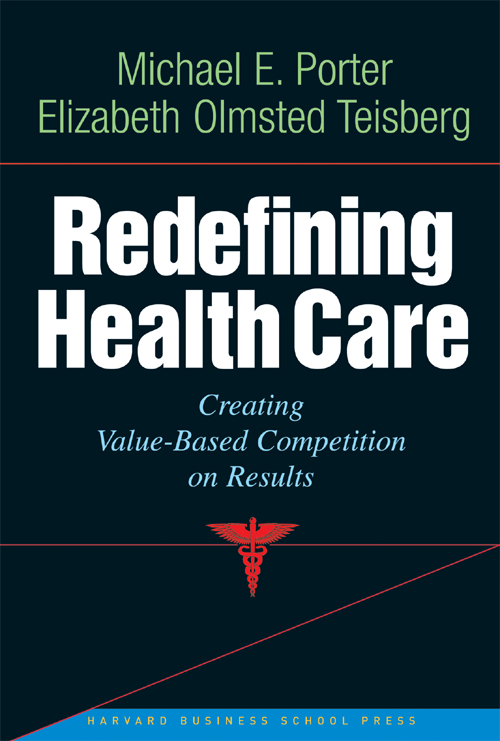Copyright 2006 Michael E. Porter and Elizabeth Olmsted Teisberg.
All rights reserved
No part of this publication may be reproduced, stored in or introduced into a retrieval system, or transmitted, in any form, or by any means (electronic, mechanical, photocopying, recording, or otherwise), without the prior permission of the publisher. Requests for permission should be directed to permissions, or mailed to Permissions, Harvard Business School Publishing, 60 Harvard Way, Boston, Massachusetts 02163.
ISBN: 978-1-59139-778-6
First eBook Edition: April 2006
To Lana, Sonia,
Tyler, and Thomas
THIS BOOK GREW out of a puzzle: why is competition failing in health care? Throughout the economy, competition among private-sectorrivals is the most powerful force yet discovered for driving improvements in the quality and cost of products and services.This is illustrated every day in countless industries around the globe.
How could the U.S. health care system, which is largely a private system and characterized by arguably more competition thanany other health care system in the world, be performing so poorly? Why are U.S. costs among the highest in the world eventhough many citizens do not have health coverage? How could costs, already so high, still be rising so rapidly? Why is qualityso uneven? Why is there growing evidence of alarming quality problems in the system?
We set out to address these questions in a field that erects daunting challenges for outsiders. The field is huge, multifaceted,and self-contained. Health care scholars tend to work just in health care, for reasons that are understandable. There is animmense body of medical and policy literature. The sheer complexity of the health care system is mind-boggling. The practiceof medicine is complicated and arcane, and medical practitioners are notoriously skeptical of non-physicians ability to contribute.Health care is different or you just dont understand are phrases one hears over and over again in the field.
We bring a point of view to our research that has not necessarily been a particularly welcomed one. There is quite a low statusattached to management in the medical field, and business is almost a dirty word. The literature on strategy for health care organizations is virtually nonexistent. Finally, in healthcare, many practitioners consider the whole idea of competition to be suspect. Physicians are taught that competition is wasteful,that it promotes self-interested behavior, and that it undermines patient care. Many equate competition with price cutting. Significant numbers of people are convinced that a monopolistic, state-controlledsystem is the only way for the United States to extricate itself from its mounting health care problem.
Our interest in health care dates back to the early 1990s. As is the case for so many Americans, we encountered the healthcare system in a personal way, in the course of addressing medical issues facing parents, relatives, and children. When Elizabethsnewborn son underwent complexand remarkably successfulheart surgery to address a medical condition that would have beenfatal or debilitating just a few years earlier, we experienced firsthand the very best of the U.S. system with all its innovation,medical skill, and human compassion. Yet even as the system was performing a miracle, getting the right doctors required circumventingthe normal system. Even more troubling was the protracted struggle, which truly became a nightmare, to obtain reimbursementfrom supposedly the best health plan available. Other encounters each of us had with the health care system contained elementsthat were troubling.
We were drawn to try to understand what was underlying the dysfunctional competition in the health care system. Given ourbackgrounds in the area of industry competition and company strategy, the puzzle of health care competition was immediatelyapparent. We concluded, in an article with Dr. Gregory Brown published in 1994, that the forces of competition were strongin health care, but that skewed incentives were driving predictable, but undesirable, results in terms of rising costs. Thearticle contained predictions that industry structure would rapidly consolidate, and it put forward some prescriptions forhow to modify the skewed incentives in the system. We then turned our attention back to other research.
Yet the puzzle of health care competition would not go away. Managed care took hold, and industry consolidation indeed increasedmarkedly over the rest of the 1990s as we had predicted. Despite the adoption of managed care, which many health care expertsthought would control costs, matters only got worse. Reform proposals continued unabated, including efforts to manage andrealign incentives, but none seemed to address the deeper issues in the system.
Meanwhile, new research began to document the pervasive quality problems in the system. We were greatly informed and influencedby the research of Jack Wennberg, Elliot Fisher, and others in the Evaluative Clinical Sciences group at Dartmouth MedicalSchool, who found huge quality variations in medical care across providers and regions with no scientific basis; by the workof the Institute of Medicine on the high rates of medical errors and the gap between the care that should be delivered and what is actually delivered; by the work of Don Berwick and Maureen Bisognano at the Institute for Healthcare Improvementillustrating the huge opportunities to enhance processes of care and improve quality; by the work of Brent James and IntermountainHealth Care on clinical process improvement and knowledge management; by the work of Bill Knaus on developing risk-adjustedoutcome measures for care provided in intensive care units to enable quality to be assessed and compared; and by others whoshed light on the many dimensions of health care quality.
This new research revealed that the puzzle was even greater than we had originally thought. Quality was just as big an issueas cost. There was not just too much care, but also too little care, and the wrong care. There were not just skewed regulatoryand private-sector incentives, but also a fundamental misalignment between the nature of competition and value for the patient.
It became increasingly clear that the nature of health care delivery needed to be transformed. We also began to believe thatto reform health care, one had to reform competition itself. And to reform competition, one had to transform the strategies,organizational structures, pricing approaches, and measurement practices of the various actors in the system. We came to seethat the problem was less a technology problem or a regulatory problem than a management and organizational problem. The overallresult was that the many talented and well-intended individuals working in the system were often working at cross purposesto patient value and were increasingly aware of, and disheartened by, this conflict.
A new stream of research began in 2000, and we began circulating a new working paper in 2003. Our point of view was greetedwith encouragement but also sharp criticism. Many health care experts hold strong beliefs and assumptions about the systemforexample, that patients will always want more medical care, that improving quality means higher costs, that technology is drivingcost increases, that quality cannot be measured in a meaningful way, that universal health coverage is the only answer, orthat empowering consumers is the only solution. We were forced over and over again to confront these perspectives and deepenour thinking.
Our article published in the June 2004 Harvard Business Review set forth an overall framework for understanding why competition in health care had failed. Given the experience with ourworking paper, we were braced for a strong dose of criticism, but instead started receiving voluminous correspondence fromindividuals representing literally every corner of the health care field, including many in other countries. While there werecritics, the vast majority of those who wrote or commented at presentations did not want to challenge our basic thesis butwere interested in how to operationalize it. Even more interesting was that many organizations were taking tentative steps in the right directions without the benefit of a broader strategic and organizational framework. We beganto realize that major improvements could occur from within the system without the need for government-led reform.









